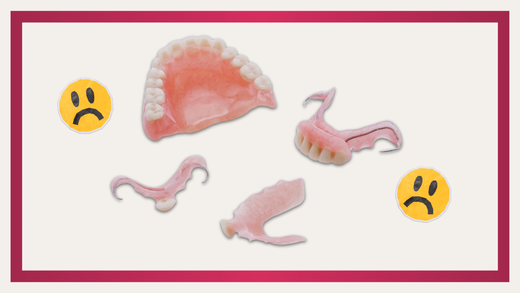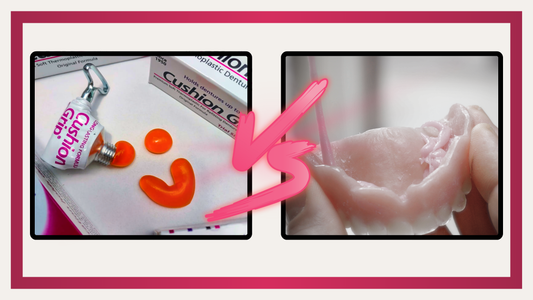Although 1 in 5 people in the U.S. suffer from a diagnosable mental health disorder each year, we still live in a society that places a stigma on those with mental health issues. Let's be real, our mental health is just as important as our physical health, so why the stigmatism?
May is Mental Health Awareness Month. The purpose of this month is to devote time to raise awareness of and reduce the stigma around behavioral health issues, and also highlight how addiction and mental illness can affect us all - patients, providers, families, and our society at large.
Break the Stigma: Embrace Understanding and Compassion
We as a society have placed horrible stigmas around addiction, mental health issues, and tooth loss. It's something that no one likes to talk about, but why is this? All three are very common, especially these days, and more closely connected than we realize. Fear. Each issue comes with its own stereotype or label and none of them are positive. People with mental illness, addiction, and tooth loss are automatically viewed in a negative way, so we are treated differently and made to feel ashamed, worthless, or even less than others. This made me hesitant to reach out for support and even at times seek the help I needed.
Depression and the Struggles of Losing Teeth

When dealing with depression and anxiety, unexpected traumatic events can significantly worsen the symptoms.
Many people may face serious dental issues early in life due to gum disease, calcium deficiencies, or genetics. Contrary to common assumptions about dentures, some individuals spend thousands of dollars and countless hours in dental chairs attempting to save their natural teeth. Unfortunately, despite their efforts, it’s not uncommon for someone to end up in full dentures earlier than expected.
Losing all your teeth takes a severe mental and emotional toll. This process is long and challenging. If you’re facing mental or physical health issues, consider waiting until you’re emotionally stable to begin.
Overcoming the Fear of Getting Dentures
The word "dentures" can be intimidating, especially for young wearers, often due to outdated stigmas. A lot of people think of or visualize their grandparents when they hear that word, but times have changed. If you're feeling scared, try searching "denture gang" on social media—you’ll find hope and support
According to SAMHSA (Substance Abuse and Mental Health Services Administration), "Self-care is essential for mental health and overall well-being. Caring for your mental health improves your physical and emotional health, builds resilience, and helps manage life's stressors in a healthy, positive way."
In addiction recovery, the importance of practicing good self-care is often emphasized repeatedly. It's natural to focus on taking care of others while neglecting your own needs. However, accepting the need for dentures and following through with the process is an act of self-care. Prioritizing your health in this way is an important step toward overall well-being.
The connection between oral health and mental well-being is profound. For example, individuals with significant tooth loss, such as having only a few remaining upper teeth, may experience severe depression, low self-esteem, and a lack of confidence. This can lead to social withdrawal and feelings of embarrassment.
Although the prospect of getting dentures can feel overwhelming, it often leads to a transformative boost in self-confidence and an improved quality of life. It’s important to remember that you are not alone—41 million people in the U.S. wear dentures. Take care of yourself, and embrace the positive changes ahead!
Overcoming the Emotional Impact of Dentures

So, you've made it through the extractions, and now you're the proud owner of a new set of dentures. Everything should be smooth sailing, right? You've made it to the finish line... or have you? It's not quite over yet! The old saying goes, "This is a marathon, not a sprint," and that couldn’t be more true when it comes to adjusting to dentures.
Having gone through this myself, I often talk about the false or unrealistic expectations people have when it comes to dentures. It’s not a quick fix – it’s a long journey. While you’ve made it through the first huge step towards a better version of yourself, there’s still much more ahead. Expect challenges along the way, as it’s likely you’ll encounter some obstacles. If you go in prepared for setbacks, you won’t be caught off guard. And if everything goes smoothly, you’ll at least know you were ready. You can never be too prepared for the denture process.
One last thing to keep in mind is that your emotions and mental state may fluctuate during the first 6 months to a year after getting dentures. This can be an emotionally draining journey, and it's normal to experience periods of depression and increased anxiety, especially early on. Many people question whether they've made the right decision, and that’s okay. Over time, as you adjust and become more comfortable with your new teeth, your emotions and mental state should stabilize and improve.
If things don't improve or if your mental health worsens after the process, please reach out to your mental health provider. Don't hesitate to call your doctor for support.
Will Things Ever Get Better?
Yes, once you've healed from the extractions and begin adjusting to your new dentures, things will improve. It takes time, but you've got this!



